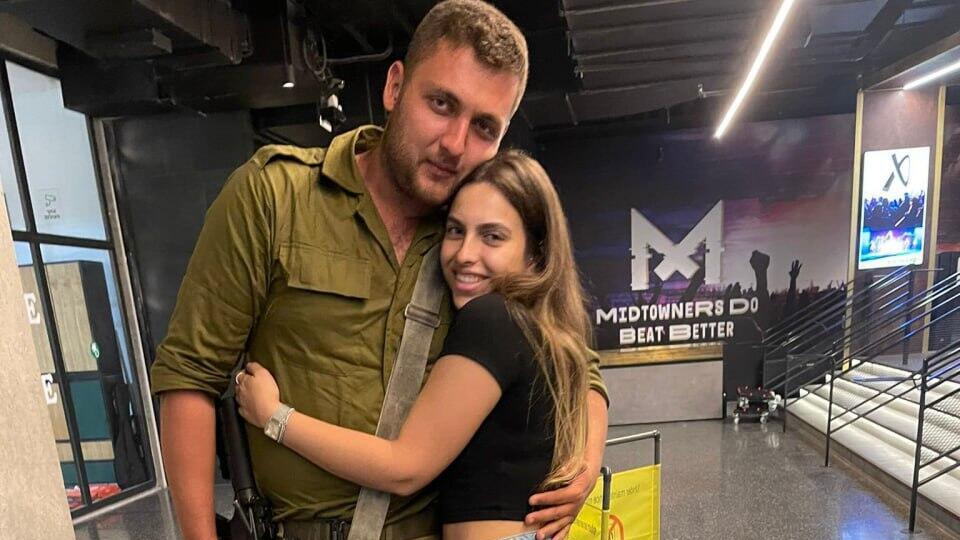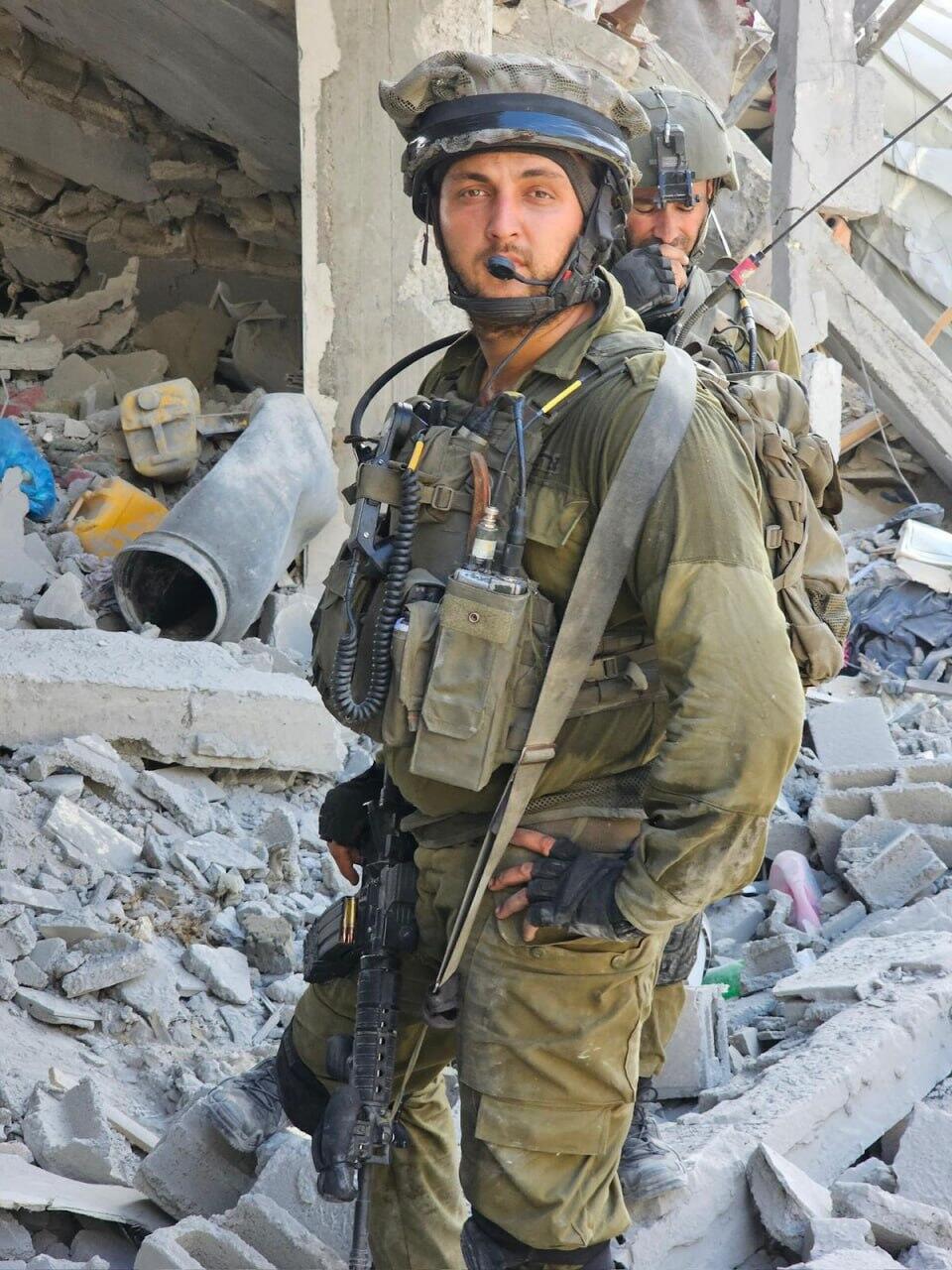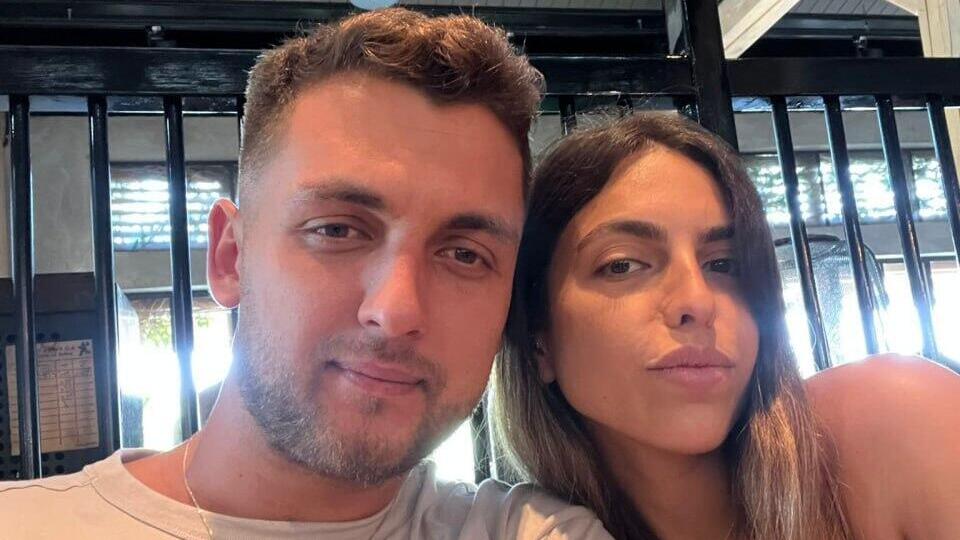Getting your Trinity Audio player ready...
Master Sergeant (res.) Sergey Shmerkin was supposed to celebrate his birthday on Thursday; he would have turned 33. His partner, Maya Elbaz, 30, wishes she could celebrate with him, but since his death, all she can do is visit his grave in the military section of the Kiryat Shmona cemetery. Now, even that is impossible.
"Being a displaced widow is like being torn from reality three times," Maya says. "Once on a national level with the war, then being evacuated from your home and finally losing your partner. They moved the funeral date three or four times due to gathering restrictions. I was really worried; this man deserved the honor of a proper burial. I told myself there was no way he wouldn't have a proper funeral. In the end, about 600 people insisted on coming.
"After that, came the shiva. I thought we'd sit at home, but they said I couldn't. I tried to insist, but it was impossible. I found myself in a hotel, sitting shiva, with crowds of people coming, and I didn't understand what was happening around me. It was crazy; I felt so detached. I cleared out our apartment with my family under fire, and today is Sergey's birthday, but after a hard decision, I can't be with him because the situation is only getting worse."
Sergey and Maya met at work. She was originally from Kiryat Shmona and had just returned to Israel after several years abroad, deciding to ease back into life by staying with her parents. Sergey came to the north from Holon. He immigrated from Ukraine at age 11 and grew up in central Israel.
He fell in love with northern Israel during his military service. "In his regular service, he was a commander in the Givati Brigade. He loved the north so much that he knew every detail. We would go hiking, and he would tell me about places more than I knew, and I grew up there. He had such a zest for life. I used to tell him he was my gift; he brought so much light into my life. He was an amazing cook, and I loved his values and principles. Even on his worst day, he would always say everything was fine and smile, always saying thank you, always blessed. A ray of sunshine."
Sergey was eager to do reserve duty, but his unit had no need for him. He kept calling until a close friend managed to get him into his unit in the 551st Brigade. "For two years, they kept at it, making phone calls and trying to persuade him," Maya said.
"I didn't know Sergey as a soldier. We had a recurring argument at home: he had a green suitcase with army gear, and I would always tell him, 'Get rid of it, you're not in the reserves now.' We'd move it around, and shove it above the closet, but he refused to unpack it for the day he'd go on reserve duty. Eventually, it got used. Three weeks before the war, he got a message that he had successfully transferred to the 697th Battalion in the 551st Brigade as a company radio operator."
At the start of the war, the northern front heated up. Maya was evacuated to Tel Aviv, and Sergey was called up for reserve duty. She made sure to reassure Sergey, convincing him not to worry about her. On the day she arrived at the hotel, Sergey called her and asked her to check how long it would take her to reach his base; he had a break. "I would drive to see him, say hello, and go back to the hotel. I had to see him," she recalled.
During his only break, Sergey insisted on showing Maya places from his childhood in Holon. "We went to eat at his favorite pizza place and met his friends. When he had to go on Thursday, I cried nonstop. I didn't understand why."
Sergey fell on November 10 after entering a booby-trapped laden tunnel shaft in Beit Hanoun. He is survived by his parents and an older brother, who remains Maya's family. Three other soldiers fell alongside him: Master Sgt. (res.) Matan Meir, Maj. (res.) Moshe Yedidyah Leiter and Sgt. Maj. (res.) Yossi Hershkovitz. "A moment before they went in, he sent me a voice message saying, 'Pray for all the people of Israel, all the soldiers and especially for me. I love you, my happiness.'"
"Today, I take that message as if he prepared me in advance: Take care of yourself, look after yourself," Maya shared. "I kept writing to him during those two weeks. On the day it happened, I sent him a long message saying no one prepared us for two weeks that feel like an eternity. His friends said he couldn't stop talking about us, that he would come back with a ring. It was clear to us we would get married. One time, sitting outside the hotel in Tel Aviv, I talked to him on the phone and said, 'Okay, let's get married,' and he said, 'Alright, I'm calling the rabbi.' We agreed that the next time he came out, we'd do it. We never got the chance."
For Maya, the funeral felt like a wedding. "It might sound ridiculous, but I felt like we went through the wedding that never happened," she said. "You're escorted together, he's in a coffin and you're beside him. There's a rabbi, the closest people and many others. You say words of love."
Besides the wedding that never was, Maya pondered the life they wouldn't have together. She struggles with the thought of returning to the north, being in Kiryat Shmona without Sergey. It's hard for her to accept that they won't have a future, that they couldn't retrieve his sperm to fulfill their dream of starting a family.
"It's tough knowing that when he was killed, he didn't have the option to choose. Not for his parents, not for me, not for him. Maybe this should be brought up with soldiers in advance as an option? We didn't think about it, but maybe for the next partner, there should be a choice."
Amid the pain, Maya begins to heal. "I want to believe there will be good, that there's light at the end of the tunnel. I'm looking for small mercies, trying to preserve his values, his way of life, his optimism. I hear him in my head saying, 'Leave the nonsense, move forward, do it.' He's supporting me from afar. He's my strength to keep going."





